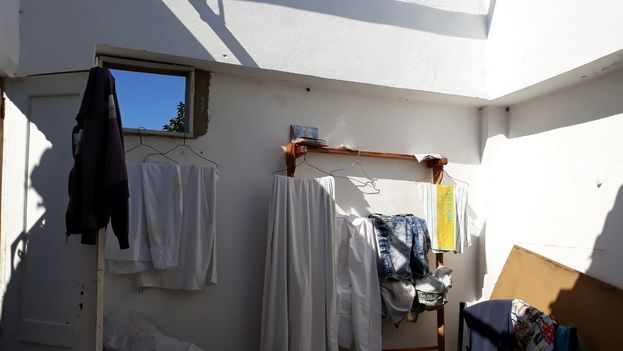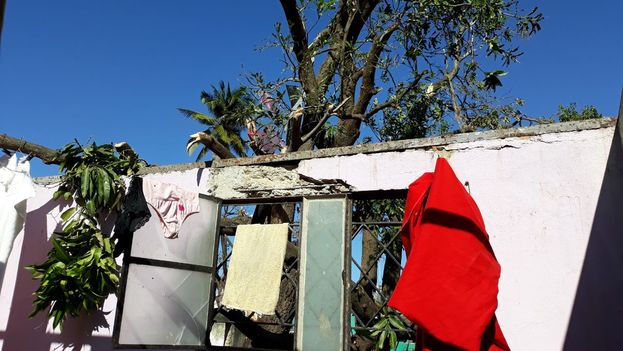
![]() 14ymedio, Luz Escobar, Havana, January 31, 2019 — Through the wide esplanade of the Church of Jesus of the Mountain the residents of Mango street go to look for food. There was Fefa, who went out this Tuesday at noon along with two friends with plates in hand. They spoke under the sun, which was burning strongly, shaking the plates from side to side, the food intact without spilling.
14ymedio, Luz Escobar, Havana, January 31, 2019 — Through the wide esplanade of the Church of Jesus of the Mountain the residents of Mango street go to look for food. There was Fefa, who went out this Tuesday at noon along with two friends with plates in hand. They spoke under the sun, which was burning strongly, shaking the plates from side to side, the food intact without spilling.
“Are you a journalist? Good, listen to this. Nobody has come here, half of my house completely fell down, I’m sleeping in the elements, without mattresses. Now I came to the church so they could give me food because I don’t even have anything to give to my daughter. It’s a lack of respect that nobody from the government has come here, and all of us are mothers,” she says while walking down the hill that leads to her street and making a gesture with her hand for the journalist to follow her.
Mango street is long and steep and since Sunday it has been filled with debris and fallen posts. Fefa walks quickly as she yells at everyone in the reach of her voice: “Come, you have to see how Mango street is. Nobody comes down here, the government has to be here in the town, with us and not in a helicopter. Here nobody has seen how the 10 of October [municipality] is. If it weren’t for the church we would die of hunger. Ah! If it’s for other countries, right away they send help, but not for us.”

“We want a roof and mattress,” repeats Fefa insistently. Entering through the door of her house, she shows a sideboard where there is some bread covered with ants. “They haven’t sent anything, barely a bread with green ham and a Tanrico drink. Look where we are sleeping, look at the mattresses, none of them is any good now, they’re soaked. I’m a daycare teacher, revolutionary, but do you believe that this is just? Not the president of the council, not the president of the government, nobody has come. Look at the mattress of my mother, an old lady of 81 who even fought in the Sierra, and look where she is sleeping.”
She wants to show the rest of her house but from the back a voice yells: “Wait, I’m bathing, I’m bathing.” In the last room of the house, with walls but without a roof, a woman who takes water out of a can with a jar, sticks her head out several times to make sure nobody comes back and sees her naked.
Fefa keeps showing the damage to her house, like the refrigerator, which was broken in two. “They asks us for money for the federation [of Cuban women] and the CDR [Committee for the Defense of the Revolution], but to do their duty by the people no. To top it off, when the help arrives they sell it to you, no, that cannot be,” she complains.
On that same block lives Emilia Delgado Mango, an older woman, who lives with her mother and still hadn’t finished building their house “by our own effort” when the tornado came.

“The first night, after that day, we slept in the kitchen, which is the only one that has a roof, seated on a big easy chair. The only thing I’ve eaten is bread with cold cuts that they brought, nothing more. They didn’t say anything about going to look for lunch, and I can’t go to Reyes park because I don’t have money and I can’t leave the house alone. Hurricanes have names, Irma, Flora…but tornados don’t,” she reflects as she shows the easy chairs that she has managed to salvage and the window she grabbed before it went flying.
In Reyes park there is a point of sale for food where for 11 CUP (Cuban pesos, roughly 45¢ US) you can get a piece of chicken, rice, and yam, but Emilia Delgado doesn’t have a peso and has only eaten a piece of bread in 48 hours. They also sell cookies for 25 pesos and pork.
In the house in front of Emilia’s lives Ada Morejón, a small but robust woman, who wears on her head a white handkerchief and on the left hand the garments of her saints. “I suffer from nerves and I’m on a base of pills since that day. Here we cook with firewood. The gas pipe broke, but nobody comes here, nobody.”
The house is beautiful. The wall of the kitchen is blue and there she has all her orishas, a cross, and a virgin. On top of the refrigerator there is a stick of bread that seems to have been there forever. She grabs her pressure cooker from on top of the sideboard and looks at it: “Since I still have no electricity I don’t know if it still works, same with the refrigerator.”
Ada Morejón took a Librium and was in bed all afternoon until she heard that there was someone to talk to about what was happening.

On the heights lives Esteban Pavón Romero, but everyone calls him Jaime. “This here was left ruined, when I felt the phenomenon that day I tried to close the door. My mom was cleaning. I grabbed her and hugged her before anything, but a piece of tile fell on her and cut her hands.”
He says that between the moment when he saw his mother hurt and until the “black storm cloud” moved away were dark minutes for him. Afterward he called an ambulance “that arrived very quickly,” he assures. “I can’t complain of the hospital, magnificent. They stitched her fingers, all good. Now, here at the house the rooms were left without a roof, the patio, everything. We were asking ourselves where the posts and tiles from my roof came to land. I sent my mother to Cerro with my sister.”
He says that the same thing has happened to all his neighbors. “Here nobody has come concerned, you are the first person to enter this house. Yesterday a woman from urban reform passed by who, from the sidewalk, asked but kept going straight past, nobody has come here. We ate because all the neighbors got together and last night we made a broth there outside on the street, that’s how we are.”
And he continues: “Nobody has worried about if the children had milk. My nextdoor neighbors have several small children and they have had to sleep here in my house, which at least has a part with a roof.”

Jaime, as everyone calls him, hopes that very soon they begin to give them “at least the tiles to put on the roof” and he would like to be able to pay for them as soon as possible because, he emphasizes, “right now nobody here has a peso.”
Further on is the house of Hilda Buch and her daughter, who is pregnant although practically still a girl. Sunday night mother and daughter had gone to bed very early when, suddenly, the tornado tossed the neighbor’s mango thicket on the roof and they went out running to the other side of the house. “Here nobody has come. We collected the debris alone. My own roof can fall at any moment, the fatal night, really cold here inside, everything is wet. Touch it, either the hard floor or the mattress that is soft but wet. We’re mostly sleeping on the floor, covering ourselves with two towels.”
Buch explains that she cannot wait for a subsidy. “That’s a lot of red tape and delay.” She believes that help needs to arrive right now, because she has nothing to pay with. “My [monthly] salary is barely around 300 pesos [roughly $12 US], but there they are selling food for 11. Here in my house we don’t have even a cent, we can’t go. We ate because a friend brought us something and also the neighbor, who made a broth for everyone. Conditions are really precarious right now, there isn’t even gas to cook.”
Translated by: Sheilagh Carey
__________________________
The 14ymedio team is committed to serious journalism that reflects the reality of deep Cuba. Thank you for joining us on this long road. We invite you to continue supporting us, but this time by becoming a member of 14ymedio. Together we can continue to transform journalism in Cuba.
